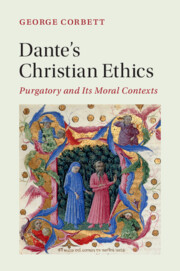A. Dante
Unless otherwise stated, the editions of Dante’s works may be found in Le Opere di Dante, edited by F. Brambilla Ageno, G. Contini, D. De Robertis, G. Gorni, F. Mazzoni, R. Migliorini Fissi, P. V. Mengaldo, G. Petrocchi, E. Pistelli, and P. Shaw, and revised by D. De Robertis and G. Breschi (Florence: Polistampa, 2012).
A.1 Vernacular Works
- Inf.
Inferno
- Purg.
Purgatorio
- Par.
Paradiso
- Conv.
Convivio
- VN
Vita nova
B. English Translations
Unless otherwise stated, the translations are adapted from the following readily available and literally translated English editions.
B.1 Vernacular Works
Convivio: A Dual-Language Critical Edition, ed. and trans. by Andrew Frisardi (Cambridge: Cambridge University Press, 2018).
Dante’s Lyric Poetry, trans. by Kenelm Foster and Patrick Boyde, 2 vols. (Oxford: Oxford University Press, 1967).
The Divine Comedy of Dante Alighieri, ed. and trans. by Robert M. Durling; introduction and notes by Ronald L. Martinez and Robert M. Durling, 3 vols. (Oxford: Oxford University Press, 1996–2011).
La Vita Nuova, trans. by Mark Musa (Bloomington/London: Indiana University Press, 1962).
B.2 Latin Works
Dante and Giovanni del Virgilio, trans. by Philip H. Wicksteed and Edmund G. Gardner (New York: Haskell House Publishers, 1970).
De vulgari eloquentia, ed. and trans. by Steven Botterill (Cambridge: Cambridge University Press, 1996).
The Letters of Dante, trans. by Paget J. Toynbee, 2nd ed. (Oxford: Clarendon Press, 1966); for the political epistles, however, Dante Alighieri: Four Political Letters, trans. by Claire Honess (London: Modern Humanities Research Association, 2007).
Monarchy, ed. and trans. by Prue Shaw. Cambridge Texts in the History of Political Thought (Cambridge: Cambridge University Press, 1996).
In most instances, the translation [in square brackets] follows the original passage. Where the sense of the original passage is clear from the main text, the original passage (in parentheses) follows the paraphrase. Discussion is always with regard to the passage in the original.
C. Commentaries
The following commentaries on the Commedia are cited according to the Dartmouth Dante Project http://dante.dartmouth.edu/ (accessed 28 June 2018):
Jacopo Alighieri (1322)
Graziolo Bambaglioli (1324)
Jacopo della Lana (1324–28)
Guido da Pisa (1327–28)
L’Ottimo Commento (1333)
Anonimo Selmiano (c. 1337)
Pietro Alighieri [1] (1340–42)
Pietro Alighieri [2] (1344–55)
Pietro Alighieri [3] (1359–64)
Codice cassinese (1460–75)
Choise ambrosiane (1355)
Gugliemo Maramauro (1369–73)
Giovanni Boccaccio (1373–75)
Benvenuto da Imola (1375–80)
Francesco da Buti (1385–95)
Johannis de Serravalle (1416–17)
Alessandro Vellutello (1544)
Lodovico Castelvetro (1570)
Gabriele Rossetti (1826–27)
Giacomo Poletto (1894)
Ernesto Trucchi (1936)
Natalino Sapegno (1955–57)
Giovanni Fallani (1965)
Giuseppe Giacalone (1968)
Umberto Bosco and Giovanni Reggio (1979)
Anna Maria Chiavacci Leonardi (1991–97)
Robert Hollander (2000–7)
Nicola Fosca (2003–15)
The citation style used is: ‘name’, gloss to cantica, ‘canto’, ‘line’ (e.g., ‘Pietro Alighieri [3], gloss to Inf. xi, 76–90’).

